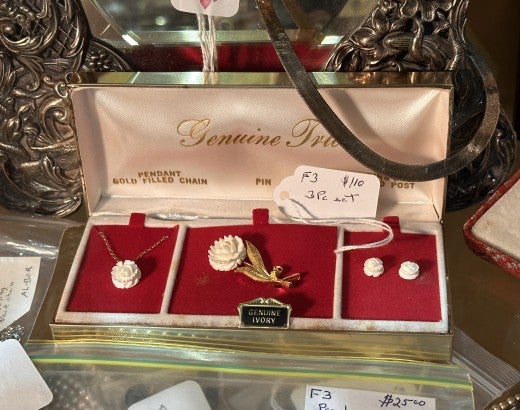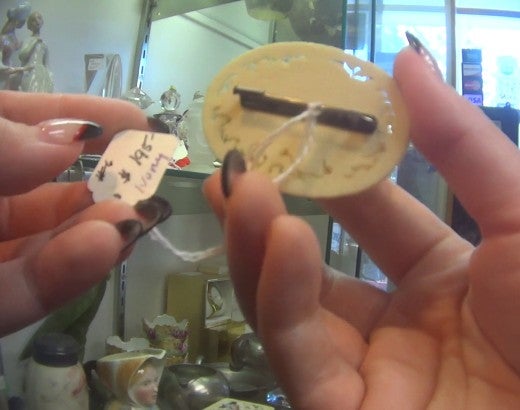Today, we’re releasing the findings of our undercover investigation revealing a thriving market for ivory products in Maryland.
A lot is at stake. Each year, between 10,000 to 15,000 African elephants are killed by poachers. A recent assessment found that the population of the endangered savanna elephant has declined by 60% and that of the critically endangered forest elephant by more than 86% since the 1970s, placing them only a step or two away from extinction.
The investigation by the HSUS and HSI, conducted between July and December 2021, uncovered hundreds of items likely made from ivory for sale at 20 stores across the state. These included carved elephant tusks, figurines, trinkets, boxes and jewelry. In most establishments, sellers of some objects labeled ivory and others that appeared to be ivory were unable to provide any information or documentation on the items’ age or origin. Written descriptions were vague and unclear, and sellers frequently claimed to know little or nothing about laws regulating the sale of ivory or seemed unaware of the ivory in their stock.
While federal law prohibits the import, export, trade or interstate commercial transport of ivory, states still have a role to play with respect to sales within their borders. Multiple states have accordingly addressed this issue, but Maryland law is silent about whether ivory can be sold within the state. That’s why we’re promoting the Wildlife Trafficking Prevention Act, HB 52/SB 381, in the Maryland General Assembly.
This legislation has direct implications for other imperiled species, too, as it would address not just ivory but would also prohibit the sale of parts and products from giraffes, hippos, pangolins, sea turtles, rhinos, lions, jaguar, cheetahs, tigers, leopards, orangutans, bonobos, chimpanzees and gorillas, along with other parts and products from elephants.
HB 52/SB 381 provides exemptions for certain antique items and musical instruments that have a properly documented record of provenance. Without such documentation, it is impossible to know whether these items are from recently killed animals, and thus imported in violation of federal law. The weakness of state law means that wildlife products continue to enter America’s marketplace. HB 52/SB 381 seeks to ensure that Maryland plays no role in facilitating the trade in illegally acquired parts and products from imperiled species.
Among the items our investigator found for sale were things many would find crass and ghoulish: An ivory tusk carved with whimsical elephants. A lamp likely made of giraffe legbone decorated with a giraffe motif. But this is an issue of combating extinction, not poor taste. We are in an urgent fight to preserve at-risk species worldwide, and we’ve made recent progress in strengthening our federal laws to halt their decimation, including a near-total national ban on commercial trade in African elephant ivory in 2016.
Even so, the U.S. is among the world’s largest markets for illegal wildlife goods, including elephant ivory and rhino horn. The illegal wildlife trade is a lucrative, multi-billion-dollar enterprise, one that fuels transnational crime and incentivizes the wanton killing of animals for their parts.
The poaching of elephants is a conspicuously merciless affair that culminates in ruthless removal of the tusks deeply embedded in the animals’ skulls. Poachers think nothing of hacking out the tusks, often while their victims are still alive, and they do not spare babies and juveniles. Strong familial bonds mean that even those who manage to escape are traumatized.
Ivory sales provide an opportunity for illegal ivory to flourish because it’s easy to mix the illegal (ivory taken from animals hunted more recently) with the legal (ivory taken well before the threat to the species became clear). Enforcement efforts are often hampered by a lack of resources or the difficulty of visually distinguishing illegal ivory from legally acquired ivory. We simply can’t afford to let ambiguity in state laws undermine these animals’ chance at survival.
In 2017, HSUS investigators visited a number of antique stores and sellers across Maryland that appeared to be selling elephant ivory, and now, five years later, we have demonstrated that it’s still a problem. With the passage of HB 52/SB 381, which is sponsored by Del. Sara Love and Sen. Will Smith, Maryland can join twelve other states and the District of Columbia, all of which have enacted similar measures to confront the trade in elephant ivory, rhino horn and other wildlife products. Our states have more than just an opportunity to play a role in stopping this trade. They have a responsibility to do so, and Marylanders can now ask their legislators to add one more to the list of states that have answered the call.
Follow Kitty Block on Twitter @HSUSKittyBlock.



